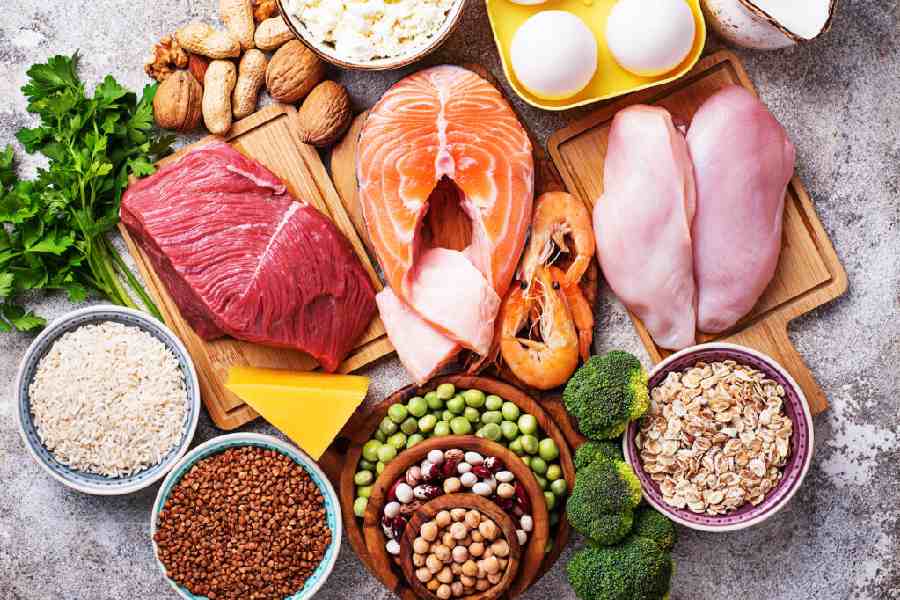Adequate diet is essential to maintain physical health.
A balanced diet of about 60 per cent carbohydrate, along with 20 per cent each of protein and fat, is acceptable.
This, along with minerals, vitamins and fibres is essential. Around three litres of water intake daily is recommended. This provides adequate amount of nutrients and calories needed to maintain energy levels and prevent lifestyle diseases. However, many people have different opinions regarding the composition of daily diet.
During the last decade there has been a great interest regarding other dietary regimens, such as vegan and ketogenic diets, especially in the younger population. Most people are keen not only to succeed in their professional careers but to avoid obesity and be physically attractive.
They tend to follow their preferred celebrities and opt for special dietary
regimens.
For a non-vegetarian balanced diet, five food items are recommended:
- Vegetables and legumes
- Cereals and grains
- Fruits, nuts and seeds
- Meat, chicken, fish and eggs
- Dairy products like milk and cheese.
Some people have an abnormal fixation on health-conscious eating habits. This is an illness called orthorexia nervosa. They develop behavioural changes. Most of these people do not possess adequate scientific knowledge but are obsessed about healthy eating.
Vegan diet
Vegan diet is a strict form of vegetarian diet which excludes all animal-related food items, including by-products. Although this form of diet hastexisted for long, its popularity has been increasing over the past decade. Compared to other dietary regimens, it is cost-effective.
Vegan diet is associated with various religious beliefs, non-violence towards animals, environmental concerns and potential health benefits. Low alcohol consumption has been reported in vegans.
This particular diet form is deficient in protein, omega fatty acids and vitamin B, especially B12, compared to other diets. Vegans usually consume fresh vegetables, fruits, cereals and grains, nuts and seeds, along with bread, potatoes and soya.
Many vegetarians do not follow vegan diet strictly.
- Lacto vegetarians: They shun meat, fish and eggs but consume dairy products.
- Lacto ovo vegetarians: They shun meat and fish but consume eggs and dairy products.
- Ovo vegetarians: Then exclude meat, fish and dairy products but consume eggs.
- Pescatarians: They restrict non-vegetarian items to fish and seafood only.
Various health benefits are associated with vegan diet. It controls obesity and reduces the incidence of non-communicable diseases, type 2 diabetes, cardiac problems and non-alcoholic fatty liver.
However, it can cause various health problems as well. Low calcium levels lead to increased incidence of fractures. Inadequate vitamin D lowers energy levels. Low vitamin B12 can cause haematological and neurological problems. Increased incidence of mental problems have also been reported.
There is no doubt that this is an established diet form but supplements are usually
necessary.
Vegan diet needs careful planning as certain options are restricted. Supervision
by a dietitian or a physician
is recommended.
Ketogenic diet
Keto or ketogenic diet is a totally different approach to weight loss and health improvement.
It changes the fuel source of energy by using fat, instead of glucose. Eating carbohydrates are restricted to a large extent. The body burn fats to produce ketones, which can be measured in blood, urine and breath.
A standard ketogenic diet contains 75 per cent fat, 20 per cent protein and 5 per cent carbohydrate. Sometimes it is combined by intermittent fasting.
The common items permitted in this dietary regimen are:
- Olive, coconut or palm oil, butter, nuts and seeds
- Non-starchy vegetables like broccoli, cauliflower, cabbage, cucumber and leafy vegetables
- Meat, chicken, fish and eggs.
Ketogenic diet tends to exclude sugar, cereals, grains, processed food and high calorie beverages like fruit juice and milk. The benefits of this diet are many. Weight loss is assured. It reduces the risk of developing type 2 diabetes, cardiac and neurological disorders. Some claim that it increases life span but that is yet to be substantiated. However, ketogenic diet needs expert supervision by a dietitian or a physician as health problems can occur.
Strict dietary regimens are difficult to follow for a long period. Although vegan and ketogenic diets are entirely different, both cause weight loss. Prevention of obesity reduces various lifestyle diseases, including cancer. Obesity is associated with breast, ovary and uterine cancers in females and oesophageal, gall bladder and colorectal cancers in males.
Many people are confused regarding the correct composition of daily diet but seldom take medical opinion unless they fall ill. Preference of any dietary regimen is always a personal choice, but the short- and long-term inadequacies must be identified and corrected.











